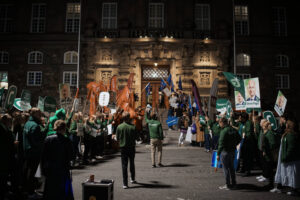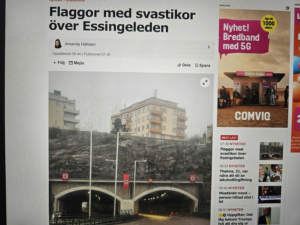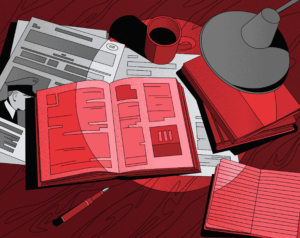This article was first published on https://jacobinmag.com/2021/07/germany-alternative-fur-deutschland-dveri-balkans-anti-immigrant-far-right - reposted here with their permission.
By Aleksandar Matković, Belgrade
When the far-right Alternative für Deutschland is reelected to the German parliament this fall, its party foundation will receive up to €80 million a year in state funding. The party already has nationalist and fascist allies across ex-Yugoslavia — and now, it will use federal funds to support their reactionary organizations.
Today Serbia’s main right-wing opposition party, Dveri Sprske (literally, “The Serbian Doors”) is also the major Balkan ally of Germany’s far-right Alternative für Deutschland (AfD). For many years Russian-oriented in both its financial and political support, more recently Dveri began to combine its pro-Kremlin stance with this German allegiance after AfD’s breakthrough in the 2017 federal elections.
Dveri has no parliamentary presence — while it did elect MPs in 2016, most of the opposition parties boycotted the 2020 contest, which saw rock-bottom turnout. Yet even on the outside it has exchanged visits with top AfD officials including MPs from the German Bundestag. It’s an example of how German parties and their foundations can help build up allies in the Balkans — including on the far-right wing of politics.
Creating Dveri
Unlike the Yugoslav wars of secession during the 1990s, Serbian nationalism in the twenty-first century has hardly been seriously analyzed. According to Srđan Mladenov Jovanović, a Serbian scholar living in China, contemporary nationalism “has been concentrated around certain extreme right-wing groups, chief among them Dveri srpske.”
Dveri was founded in 1999 as a Christian-right youth organization, consisting mainly of students at the University of Belgrade. By 2013, it had sixteen offices in the capital and eighty-two across Serbia’s a hundred forty-three municipalities. In 2016, it formed a coalition with the Democratic Party of Serbia, called the Patriotic Bloc, which won 5 percent support (190,530 votes) and seven seats in the Serbian parliament.
This was a milestone for a group that began as an underground student movement, espousing the clerical-nationalist views of its central object of veneration, one Nikolaj Velimirović. An early twentieth-century Serbian Orthodox priest, he once praised Hitler as a “genius and hero” and — after restoring a German military cemetery in Bitola, today’s North Macedonia — was even decorated by the Nazi dictator himself in 1935.
According to Jovanović, “Velimirović was known for his racist proclivities, antisemitic opinions, and statements such as: ‘We are of the Aryan race by blood, our surname is Slavic, our name Serbian, our heart and soul Christian.’” This devotion brought the Dveri movement close to the Serbian Orthodox Church (which canonized Velimirović in 2003) and, after the fall of dictator Slobodan Milošević in the 2000s, to the new Serbian government.
In addition to their friends in the Orthodox Church, Dveri also began to court the attention of the then prime minister Vojislav Koštunica (2004–8), who praised Nikolaj Velimirović as “our leader” who “is and will always be with us.” Against this backdrop, it should not be surprising that both the government and the church — through the Ministry for the Diaspora and one ecclesiastical leader — began to fund the Dveri movement (the name it adopted in 2013). Henceforth, Dveri would trample on the supposed separation of powers between church and state.
From Neofascist to “Democratic” Opposition
Between these institutions, a new image of Dveri movement emerged. After a period of infighting, it took on a new electoral face in the shape of Boško Obradović, a former librarian today at the forefront of the opposition to the ruling Serbian Progressive Party and its leader Aleksandar Vučić.
After becoming as MP in 2016, Obradović also led the 2018–19 mass protests as the head of the entire opposition. He is also a pro-AfD figure, of far-right background. In addition to the one-time pro-Hitler Orthodox priest Velimirović, another personal hero is an antisemitic, fascist ideologue from the same period, namely Dimitrije Ljotić — a follower of the French protofascist and Action Française ideologue Charles Maurras.
This admiration caused some scandal in the Serbian media. This owed not least to Obradović’s statements “I like Ljotić, so what?” — the parallel of which would be “I like Vichy” or “I like Oswald Mosley, so what?” and similar. Indeed, in the 1940s, Ljotić’s nationalist and openly antisemitic Zbor movement participated in the Serbian puppet regime under German occupation. It was tasked with selecting Jews and later came under direct control by SS leader August Meyszner.
However, after Obradović became an MP, both he and Dveri began to soften their stance. He adopted a “statesmanlike” demeanor, in keeping with his role as a member of parliament. But he also pushed the church’s agenda in relation to Kosovo: the Serbian Orthodox Church was excluded from Belgrade’s dialogue with Pristina over Kosovo’s secession in 2008, but considers this Serbian territory and has direct interest in terms of the status of monks, churches, and other financial and physical property.
Ahead of elections slated for later in 2021, Boško and Dveri are further seeking to mainstream their image. Even after Dveri lost its parliamentary role due to the opposition boycott of the last elections, it continued its transformation by promoting green activism and a rhetoric of economic solidarity.
This is evident in its new program “System Change — Security for All!” including points on “green patriotism” (under the heading “You Guard!”), legal responsibility (under the heading “You Control!”), and even participatory democracy (under the heading “You Decide!”). In the northern city of Subotica, Dveri even proposed the introduction of a “solidarity budget“, while Obradović bragged on Instagram about having read Thomas Piketty, Naomi Klein, and similar. All this serves to make Dveri appear as a more politically correct, Christian-democratic force.
Help From Berlin
Along “evolution” over two decades took Dveri from its beginnings as an antisemitic and homophobic group of friends of German and Serbian fascism to an accepted — and even important — political force in Serbia today. Nevertheless, the main reason for concern is more contemporary, and less a matter of history. For in many ways, Dveri’s transformation has run parallel to the process within the AfD.
The shift in the politics of Dveri came at a time when the far-right AfD faction “Der Flügel” (The Wing) was banned by Germany’s Office for the Protection of the Constitution and when tensions over a possible coalition between the AfD and the German Christian Democrats (CDU) were still fresh.
When the CDU was beaten to third place by the AfD in the 2020 state elections in Thuringia, seventeen CDU politicians wrote a letter calling for the “cordon sanitaire” against the far-right party to be lifted, while in Saxony-Anhalt Reiner Haseloff, the CDU’s prime minister, had to reject a coalition with the AfD earlier this year. Nevertheless, as much as the AfD and Dveri have tried to hide their more extreme elements, the fact that they are working closely together is itself cause for concern.
One of the party’s top leaders — Dragana Trifković, Dveri’s contact person in both Moscow and Berlin — is also one of the figures behind the “German Center for Eurasian Studies.” Other cofounders include Markus Frohnmaier, a Romanian-born and pro-Russian AfD MP, who is also former chairperson of “Young Alternative for Germany.” Another example is one of the main Dveri economists and former members of Dveri’s main committee, Predrag Mitrović, who studied at the Frankfurt School of Finance & Management and also worked in HypoVereinsbank, as his personal biography states.
But most importantly, Obradović himself has been visiting the AfD since at least 2017, when he met leading AfD figure Jörg Meuthen during a visit to the parliament of Baden-Württemberg, where the AfD won 15 percent of the vote in 2017. Obradović introduced himself as coming from the “Serbian AfD” and discussed their common ideas. Meuthen and Obradović were on the same page on family values and their “fight against the Brussels commissioners,” as well as on border protection and the migrant crisis.
Then, in 2020, Obradović and Trifković visited Germany again. On his Twitter account, Obradović boasted that he had “a long-standing cooperation” with the AfD, and especially with Meuthen. But, he added “today we have the chance to meet the co-chairman of the AfD Tin Kurpalla, as well as his parliamentary group in the Bundestag.”
During his “working visits” to the Bundestag, the Serbian media reported, the message was a “defense of our Christian homeland from the complex issue of the migration crisis”; Obradović thanked the AfD for its support of Serbia over Kosovo and its criticism of the 1999 NATO bombing campaign.
The AfD has long criticized Germany’s state-funded party foundations, each associated with a party that has been elected to the German Bundestag at least twice in a row (e.g. the Friedrich-Ebert-Stiftung is associated with the Social-Democrats, the Konrad-Adenauer-Stiftung with the CDU). Yet ahead of September’s German general election, the AfD-owned Desiderius-Erasmus-Stiftung itself looks set to access federal funds.
According to Die Zeit, if the AfD enters the Bundestag for the second time, its foundation could receive up to €80 million a year. This money would be used to promote “German interests in the world” along with the party’s international contacts, according to the foundation’s website.
The result would be quite paradoxical: part of Germany’s political foundations, rebuilt and expanded after the defeat of the Nazi regime in the name of countering “antidemocratic” forces, would thus become a factor for political instability, both through its development within Germany and the exportation of its message. In a post-Merkel Europe, this could mean more backing for Obradović and Dveri in Serbia.
Hedging Their Bets
Dveri might be the AfD’s strongest partner in Serbia, but it’s only the tip of the iceberg. It’s worth emphasizing how active AfD has been in contacting various other right-wing movements over the years. Serbia has been visited at least once a year by one of the most controversial AfD members — Frohnmaier, one of the initiators of the Der Flügel in Erfurt (now allegedly disbanded over accusations of fascism), the Junge Alternative, and also the youngest member of the German Bundestag.
This effort also involves Frohnmaier’s assistant, fellow former Der Flügel member Dubravko Mandić. According to Balkan Insight, “Mandić and Frohnmaier have been trying to spread AfD’s message to Croatia and Serbia: ‘We are their voice,’ Mandić said, ‘even if here we are considered to be right-wingers, racists and opponents of foreigners.’”
In Croatia, Mandić met with two right-wing extremist MPs — former culture minister Zlatko Hasanbegović (known for his crackdown on left-wing cultural organizations) and retired general Željko Glasanović. This latter admitted to Deutsche Welle that he had German neo-Nazi NPD members under his command during the Yugoslav wars of the 1990s. Given that members of Greece’s Golden Dawn were involved in the Srebrenica massacre, it should come as no surprise that old links between European fascist organizations are still active, including with the AfD. Old habits die hard.
But Frohnmaier and Mandić are not only the “voices” of the German right in Serbia — for they are also active in practice. For example, Frohnmaier has worked with Miroslav Parović, a former Dveri member and leader of the Serbian Freedom, a right-wing organization and Dveri offshoot that contested the 2017 presidential elections. Frohnmaier even spoke in Smederevska Palanka as part of Parović’s campaign, and Parović was also invited to sessions of the German parliament. With all this movement, more right-wing extremists from Germany were bound to come.
One was Götz Kubitschek, the far-right journalist and publisher from Ravensburg, who during 2017’s federal election gave a lecture at the Matica Srpska cultural foundation entitled “The Minimal Demands of the Right in Germany.” Due to pressure by Roma civil society organizations, the Serbian Ministry of Culture and Information had to publicly ask whether the state’s oldest cultural foundation was promoting fascism — which it naturally denied.
During his lecture Kubitschek had “emphasized the importance of the AfD for Germany and the change away from the neoliberal system.” To make matters worse, this was after he had given a lecture at the Institute of European Studies on Nazi jurist Carl Schmitt’s “controversial years 1932–1936.” Unfortunately, this was not a one-sided relationship, nor was it the last example of Serbian academics making contacts with the AfD.
In 2018, Serbian media noted how Belgrade Institute for Political Studies’ researcher Dušan Dostanić was a guest speaker at AfD-related seminars organized by Kubitschek himself in Germany. Leo Marić, a Croatian “identitarian” leader, appeared alongside them — making for a region-wide far-right affair.
Future Ties
Whether this far-right pact escalates into a form of what Luigi Fabbri called “preventive counterrevolution,” or remains at the level of clandestine connections, we cannot know. But some facts simply cannot be denied.
Even from the sparse information available in the public domain, we can see that the AfD has already eagerly supported presidential candidates in Serbia. And, moreover, one cannot deny the attempt to form coalitions under the aegis of the AfD by figures like Zlatko Hasanbegović in Croatia and Obradović in Serbia, as well as other former participants in the Yugoslav wars.
Considering that the AfD is already actively meeting with other leaders in the region (including Croatia, an EU member state), it seems that the party is preparing its way for a post-Merkel future — including German foreign policy.
Notably, the AfD supports Serbia on the Kosovo issue, in turn putting it close to Russia (on whose UN Security Council veto power Serbian nationalists also rely). The AfD’s interest in closer economic cooperation with Russia may also explain why it wants to build close ties with Serbia, where the southern stream of the Russian gas pipeline is located. This makes Serbia both dependent on the Russian gas giant and a potentially important player in exporting gas outside Europe.
Finally, the AfD’s vision of the future, like that of the neo-Nazi NPD and its Balkan counterparts, is one in which peripheral states like Serbia and Croatia return to the past. They want these states to become decisive bulwarks against the “threat” of immigrants, in defense of “Fortress Europe” — a narrative that is all too common both in Germany and abroad.
As one reporter put it, “For decades, the Balkans was seen as exporting instability to Western Europe. Now Germany’s far-right is trying to extend its own ideology into southeastern Europe.” While it is not uncommon for the German right to support certain actors in peripheral European states (like Bulgarian prime minister Boyko Borissov), it is certain that we have not yet seen the true power of AfD support. We can fully expect its increased funding after September’s federal elections to change this.
The COVID-19 pandemic has somewhat disrupted Europe’s far right in favor of more established forces — but this does not mean that it will magically disappear. On the contrary, the AfD’s financial support could become a “fiscal stimulus” coming at just the right time for its Balkan co-thinkers — and making it easier to form a Europe-wide far-right power bloc.







